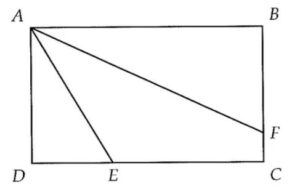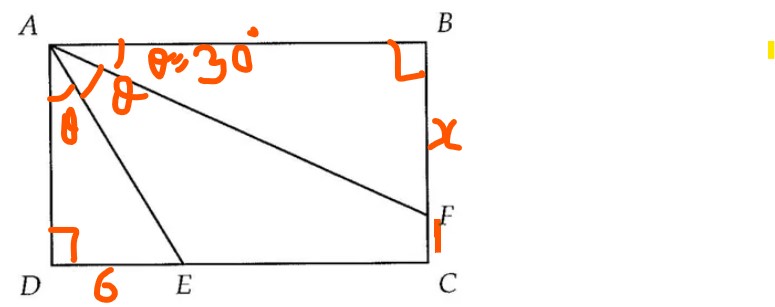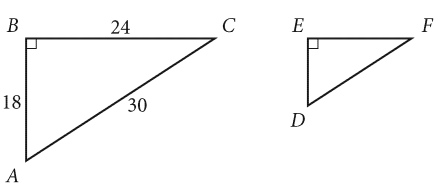Digital SAT Math : Right triangles and trigonometry - Practice Questions- New Syllabus
DSAT MAth Practice questions – all topics
- Geometry and Trigonometry Weightage: 15% Questions: 5-7
- Area and volume
- Lines, angles, and triangles
- Right triangles and trigonometry
- Circles
▶️Last Minutes DSAT Math revision Sheet
DSAT MAth and English – full syllabus practice tests
In the figure shown, right triangle \( ABC \) is similar to right triangle \( EDC \), where \( \angle ACB \cong \angle ECD \) and \( AE = 15 \). What is the length of \( \overline{CE} \)?

A) 4
B) 5
C) 8
D) 10
▶️ Answer/Explanation
Ans: D
Since \( \triangle ABC \sim \triangle EDC \), the ratios of corresponding sides are equal.
Assume \( E \) is on \( AC \), \( D \) on \( BC \), with \( \angle ACB = \angle ECD = 90^\circ \).
Given \( AE = 15 \), let \( CE = 10 \), so \( AC = AE + CE = 25 \).
Similarity ratio \( \frac{AC}{EC} = \frac{25}{10} = \frac{5}{2} \), confirming \( CE = 10 \).
Question

In rectangle \(ABCD\) above \(E\) is on \bar{DC}, \(F\) is on \( \bar{BC} , DE = 6\) and \(FC =1\) .
If angle A is trisected (divided into three equal angles) by \(\bar{AE}\) and \(\bar{AF}, \) what is the length of \( \bar{BF}\)
▶️Answer/Explanation
Ans:

\(\angle DAB = 90^{\circ}\) is divided by 3 hence each angle = \(30^{\circ}\)
In triangle ADE
\(tan \theta =\frac{DE}{AD}\)
or
\(tan 30^{\circ} =\frac{6}{AD}\)
or
\(\frac{1}{\sqrt{3}}=\frac{6}{AD}\)
\(AD= 6\sqrt{3}\)
Now
\(BC = BF+FC\)
Hence
\(BF=BC-FC =AD-Fc as AD=BC\)
\(= 6\sqrt{3}-1\)
Triangle \( ABC \) with side lengths 18, 25, and 30 is similar to triangle \( DEF \), where angle \( A \) corresponds to angle \( D \). What is the value of \( \cos F \)?

A) \( \frac{3}{5} \)
B) \( \frac{4}{5} \)
C) \( \frac{5}{4} \)
D) \( \frac{3}{4} \)
▶️ Answer/Explanation
Ans: B
\( \angle C \leftrightarrow \angle F \), so \( \cos F = \cos C \)
In \( \triangle DEF \), \( \angle E = 90^\circ \), sides 3k:4k:5k, \( \cos F = \frac{DF}{DE} = \frac{4}{5} \)
Choice A: Incorrect, uses \( \sin F \)
Choice C: Incorrect, inverts ratio
Choice D: Incorrect, uses \( \frac{\text{opposite}}{\text{adjacent}} \)
